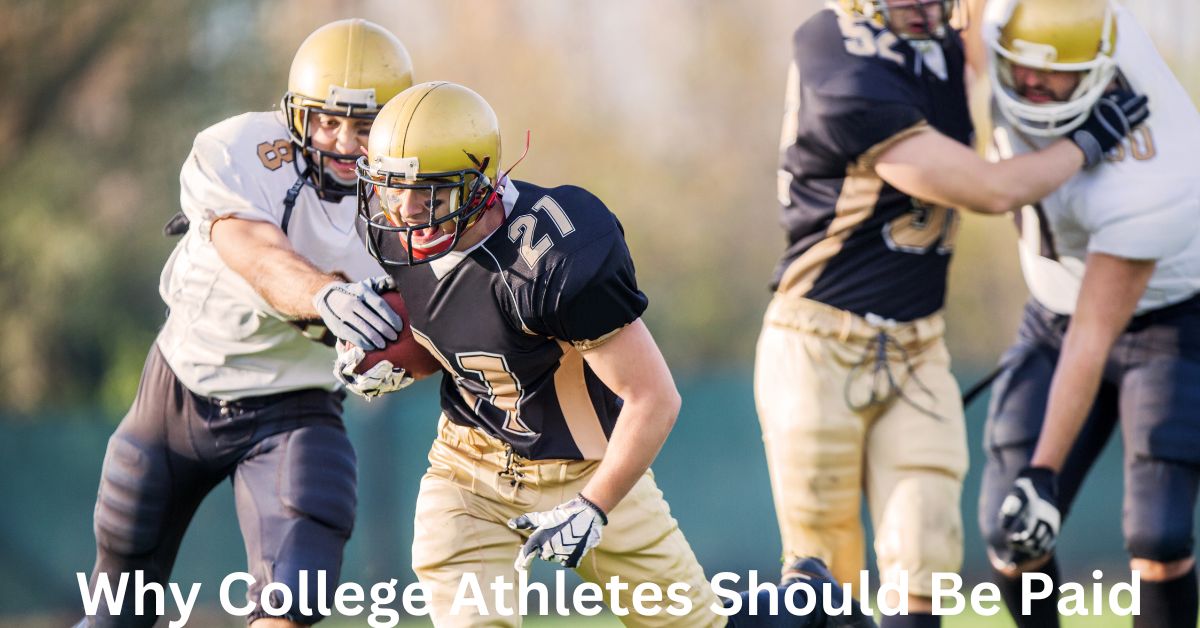In later a long time, the wrangle about over whether college competitors ought to be paid has escalates, with enthusiastic contentions on both sides of the issue. On one hand, there’s a developing agreement that these competitors, who bring in critical income for their colleges and colleges, merit recompense for their abilities and endeavors.
On the other hand, there are concerns approximately the potential suggestions of paying student-athletes, counting questions almost awkwardness and the judgment of collegiate sports. In this article, we’ll dig into the reasons why college competitors ought to be paid, analyzing the money related substances of collegiate sports, the challenges confronted by student-athletes, and the potential benefits of remuneration.
The Financial Realities of Collegiate Athletics
College games in the Joined together States is enormous trade. From profitable tv bargains to sponsorship understandings and ticket deals, major college sports programs create millions of dollars in income each year.
Why College Athletes Should Be Paid At the center of this monetary biological system are the student-athletes themselves, whose abilities and exhibitions drive the victory of their groups and contribute to the by and large benefit of collegiate athletics.
Despite the significant incomes produced by college sports, the endless larger part of student-athletes get no coordinate monetary stipend past their grants. Whereas grants certainly give profitable back for student-athletes, they regularly drop brief of covering the full taken a toll of going to college, taking off numerous competitors battling to make closes meet.
Furthermore, NCAA directions confine student-athletes from gaining salary from supports or other openings related to their athletic capacities, encourage constraining their capacity to capitalize on their talents.
Student-athletes confront special challenges that set them separated from their peers. Adjusting the requests of thorough scholastic coursework with the thorough preparing and competition plans required of collegiate competitors can be fantastically challenging. Numerous student-athletes spend incalculable hours each week practicing, traveling to recreations, and assembly group commitments, clearing out small time for part-time work or other sources of income.
Moreover, the seriously weight to perform at a tall level can take a toll on student-athletes’ mental and physical well-being. Wounds are a steady hazard for competitors competing at the collegiate level, and the fear of supporting a career-ending damage can weigh intensely on their minds.
In spite of these challenges, student-athletes are anticipated to keep up scholarly qualification and meet the same scholarly benchmarks as their non-athlete peers, frequently without the same level of back or flexibility.
The Case for Reasonable Compensation
Given the critical monetary commitments that college competitors make to their teach and the challenges they confront, there is a compelling contention to be made for compensating these competitors for their endeavors. Paying college competitors would not as it were give much-needed monetary bolster to student-athletes but would too recognize their commitments to the victory and productivity of collegiate athletics.
Fair recompense for college competitors may take different shapes, counting stipends to cover living costs, healthcare benefits, and the capacity to benefit from their title, picture, and resemblance. Permitting student-athletes to win wage from supports and other openings would empower them to capitalize on their abilities and set up a more evenhanded playing field inside collegiate athletics.
The Potential Benefits of Compensation
In expansion to tending to the budgetary needs of student-athletes, paying college competitors seem have broader benefits for the collegiate sports scene. By giving competitors with reasonable emolument, colleges and colleges might draw in and hold beat ability, improving the quality of competition and the generally fan involvement.
Why College Athletes Should Be Paid Besides, compensating college competitors seem offer assistance level the playing field for student-athletes from impeded foundations, guaranteeing that all competitors have an rise to opportunity to succeed.
Furthermore, reasonable recompense seem advance the well-being of student-athletes by lessening monetary stretch and giving them with more prominent monetary security. This, in turn, seem lead to made strides scholarly execution and graduation rates among student-athletes, as they would be way better able to center on their ponders without the burden of monetary hardship.
Key Takeaways
Revenue Generation: College athletes, in particular those in famous sports activities like football and basketball, generate great sales for his or her faculties and the NCAA.
Student-Athlete Workload: The time commitment and physical demands on university athletes may be overwhelming, frequently surpassing that of a standard pupil.
Equity and Fairness: Many argue that athletes must be compensated for their contributions and to deal with issues of equity and exploitation.
Impact on Amateurism: Paying athletes could impact the traditional concept of amateurism in college sports activities.
Financial Considerations: Schools and the NCAA face monetary challenges, and the implementation of athlete bills would require careful making plans.
Table
| Argument | For Paying College Athletes | Against Paying College Athletes |
|---|---|---|
| Revenue Generation | College athletes, especially in football and basketball, generate significant revenue for their schools and the NCAA. | Schools might argue that paying athletes could divert funds from other areas. |
| Student-Athlete Workload | Athletes often have demanding schedules that include practice, games, and travel, in addition to their academic responsibilities. | Paying athletes might lead to further complications in balancing academics and sports. |
| Equity and Fairness | Many believe that it is fair to compensate athletes who contribute to the financial success of their programs. | Concerns about fairness arise, including how to address athletes in non-revenue sports. |
| Impact on Amateurism | Paying athletes could challenge the traditional amateur status of college sports. | Maintaining amateurism is crucial for preserving the spirit of college sports. |
| Financial Considerations | Implementing a payment system could address issues of exploitation and provide necessary support for athletes. | Financial constraints may limit how much schools can afford to pay athletes. |
Advantages of Paying College Athletes
Fair Compensation: Paying university athletes recognizes their difficult work and the sales they assist generate. For many, gambling sports activities isn’t just a interest however a full-time job that entails excessive schooling, journey, and games, which may be more traumatic than a normal part-time process.
Reduction of Exploitation: Many college athletes come from much less privileged backgrounds. Payment ought to assist reduce exploitation by means of providing them with economic aid to cowl dwelling charges, training, and different needs.
Improved Athlete Welfare: Payments should lead to better health care, nutrients, and mental fitness aid, that are important for athletes who push their our bodies to the limit. Enhanced assist structures could cause higher overall performance and average nicely-being.
Increased Motivation: Financial repayment would possibly boom athletes’ motivation and performance levels. When athletes experience valued and pretty compensated, they will be extra dedicated to their sports and their educational duties.
Fairness Across Sports: If based nicely, a price device ought to make sure that athletes in all sports obtain truthful compensation. This may want to address equity issues and offer aid to athletes in much less prominent sports activities.
Disadvantages of Paying College Athletes
Impact on Amateurism: Paying athletes should blur the traces among beginner and expert sports. The traditional idea of amateurism, which emphasizes the educational aspect of university sports, is probably compromised.
Financial Strain on Schools: Many faculties, especially smaller establishments, would possibly warfare to have enough money payments. The value of compensating athletes may want to result in finances cuts in different regions, including academic programs or centers.
Potential for Inequality: Determining a way to distribute payments pretty amongst athletes could be hard. There may be disagreements over how plenty every athlete have to acquire, particularly among the ones in high-revenue and low-revenue sports.
Complexity of Implementation: Creating a payment system includes full-size logistical demanding situations. This includes identifying payment structures, managing contracts, and addressing felony and compliance troubles.
Potential Disruptions: Introducing payments might disrupt team dynamics and the general university sports culture. It may want to lead to problems along with multiplied opposition for price
FAQs about Why College Athletes Should Be Paid
Q: Wouldn’t paying college competitors weaken the unprofessional quality of collegiate sports?
A: Whereas awkwardness has long been a foundation of collegiate sports, the scene of college sports has advanced altogether in later a long time. With colleges and colleges procuring considerable monetary rewards from their athletic programs, numerous contend that it’s as it were reasonable for student-athletes to get a share of the profits.
Q: How would paying college competitors be implemented?
A: There are different recommendations for compensating college competitors, counting stipends, healthcare benefits, and the capacity to benefit from their title, picture, and resemblance. NCAA directions would likely require to be corrected to permit for these shapes of compensation.
Q: Wouldn’t paying college competitors make incongruities between competitors in diverse sports?
A: It’s conceivable that paying college competitors seem compound existing incongruities between competitors in revenue-generating sports and those in non-revenue-generating sports. In any case, with cautious arranging and thought, colleges and colleges might work to guarantee that emolument measures are reasonable and impartial for all student-athletes.
Conclusion
In conclusion, the case for paying college competitors is a compelling one. Why College Athletes Should Be Paid From the critical monetary commitments they make to the challenges they confront as student-athletes, there are clear reasons why these competitors merit reasonable emolument for their endeavors. By giving student-athletes with the bolster and acknowledgment they merit, colleges and colleges can offer assistance make a more evenhanded and economical future for collegiate games. It’s time to recognize the esteem of college competitors and guarantee that they are reasonably compensated for their commitments to the amusement.










